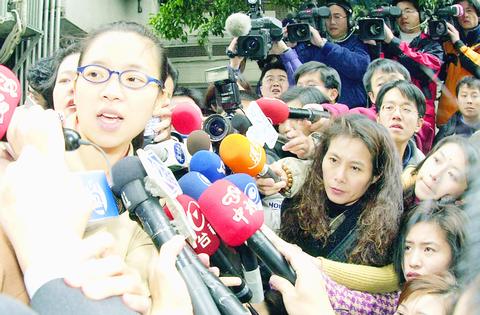Bowing three times before reporters, 36-year-old Chu Mei-feng (璩美鳳) apologized yesterday more than a week after a VCD that allegedly showed her having a sexual encounter with a married man was distributed by a weekly tabloid-style magazine.
The former director of the Hsinchu Cultural Affairs Bureau spoke in public for the first time yesterday since the scandal erupted, 12 hours after the key suspect in the secret taping was summoned for questioning, local Chinese-language media reported.
Accompanied by her lawyer Chung Yung-sheng (鍾永盛) and her friend, New Party Taipei City Councilor Huang Shan-shan (黃珊珊), Chu told reporters yesterday she was deeply sorry for the incident.

PHOTO: GEORGE TSORNG, TAIPEI TIMES
"I kept bad company and erred. I feel deeply ashamed for causing such an uproar in society," Chu said before bowing to reporters, who mobbed her at the entrance of her former residence.
The "bad company" she referred to is believed to be her former "spiritual growth" instructor Kuo Yu-ling (
Chu had previously attended classes taught by Kuo at a "religious healing" organization called Avatar.
"The statements Kuo made to prosecutors and the media are at odds with the truth. ... Now that the investigation has been conducted, I will provide only prosecutors with details about the case," Chu said.
"I hope that after the truth is discovered, the judges will seek heavy penalties [for those involved]."
After reading her statement, Chu collapsed, crying.
She was rushed to a hospital for treatment.
Kuo has emerged as a key figure in the controversy as investigators try to determine who was behind the taping of the video, which was shot with a pinhole camera.
Prosecutors for the first time questioned Kuo early yesterday morning. After a four-hour interrogation, Kuo was released around 4am.
According to local Chinese-language media, Kuo told prosecutors that Chu had requested that a hidden camera be installed in her room in order to protect her personal safety. But Kuo said she did not know the location of the pinhole camera.
Spokesman for the Taipei District Prosecutors' Office Chen Hung-ta (陳宏達), refused to confirm Kuo's statements.
Chen said the case was a criminal one, and that "Kuo has been officially listed as a defendant in this case." Prosecutors are unable to publicly comment on their investigation, Chen said.
"As for former Hsinchu City Mayor Tsai Jen-chien (
It has been speculated that Tsai, Chu's former boyfriend, could have been involved in the taping because he has a key to Chu's apartment.
Prosecutors said that because Chu's and Kuo's testimonies differed in many aspects, they will summon the two again for further questioning.
On Monday, prosecutors led a task force to examine Chu's residence in a search for more clues. The preliminary investigation found that the VCD must have been shot from inside a TV cupboard opposite Chu's bed in her bedroom.
A police search with an infrared detector failed to locate a camera inside the room. Police took fingerprints from the bedroom for further investigation.
Yesterday afternoon, Taipei prosecutors questioned employees at a repair shop where Chu had taken the TV cupboard in her bedroom to be repaired.

DAREDEVIL: Honnold said it had always been a dream of his to climb Taipei 101, while a Netflix producer said the skyscraper was ‘a real icon of this country’ US climber Alex Honnold yesterday took on Taiwan’s tallest building, becoming the first person to scale Taipei 101 without a rope, harness or safety net. Hundreds of spectators gathered at the base of the 101-story skyscraper to watch Honnold, 40, embark on his daredevil feat, which was also broadcast live on Netflix. Dressed in a red T-shirt and yellow custom-made climbing shoes, Honnold swiftly moved up the southeast face of the glass and steel building. At one point, he stepped onto a platform midway up to wave down at fans and onlookers who were taking photos. People watching from inside

MAKING WAVES: China’s maritime militia could become a nontraditional threat in war, clogging up shipping lanes to prevent US or Japanese intervention, a report said About 1,900 Chinese ships flying flags of convenience and fishing vessels that participated in China’s military exercises around Taiwan last month and in January last year have been listed for monitoring, Coast Guard Administration (CGA) Deputy Director-General Hsieh Ching-chin (謝慶欽) said yesterday. Following amendments to the Commercial Port Act (商港法) and the Law of Ships (船舶法) last month, the CGA can designate possible berthing areas or deny ports of call for vessels suspected of loitering around areas where undersea cables can be accessed, Oceans Affairs Council Minister Kuan Bi-ling (管碧玲) said. The list of suspected ships, originally 300, had risen to about

A Vietnamese migrant worker yesterday won NT$12 million (US$379,627) on a Lunar New Year scratch card in Kaohsiung as part of Taiwan Lottery Co’s (台灣彩券) “NT$12 Million Grand Fortune” (1200萬大吉利) game. The man was the first top-prize winner of the new game launched on Jan. 6 to mark the Lunar New Year. Three Vietnamese migrant workers visited a Taiwan Lottery shop on Xinyue Street in Kaohsiung’s Gangshan District (崗山), a store representative said. The player bought multiple tickets and, after winning nothing, held the final lottery ticket in one hand and rubbed the store’s statue of the Maitreya Buddha’s belly with the other,

Japan’s strategic alliance with the US would collapse if Tokyo were to turn away from a conflict in Taiwan, Japanese Prime Minister Sanae Takaichi said yesterday, but distanced herself from previous comments that suggested a possible military response in such an event. Takaichi expressed her latest views on a nationally broadcast TV program late on Monday, where an opposition party leader criticized her for igniting tensions with China with the earlier remarks. Ties between Japan and China have sunk to the worst level in years after Takaichi said in November that a hypothetical Chinese attack on Taiwan could bring about a Japanese